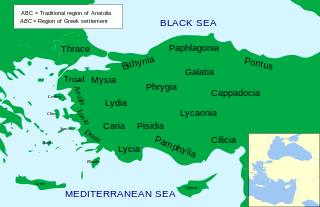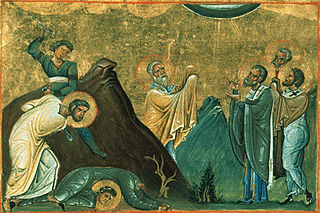English usually refers to:
Red River usually refers to one of the following:
Paris is the capital of France, which may consist of :
James is a common English language surname and given name:
Saint Bernard refers primarily to Bernard of Clairvaux (1090–1153), a Christian saint, mystic, and reformer of the Cistercian order.

Konya is a large, industrially developed city in central Turkey, on the south-western edge of the Central Anatolian Plateau. It is the capital of Konya Province and has a reputation for social conservatism which is frequently belied by its many innovative urban projects. During antiquity and into Seljuk times it was known as Iconium, although the Seljuks also called it Darü'l-Mülk, meaning "seat of government". In 19th-century accounts of the city in English its name is usually spelt Konia or Koniah.
Black River is a common name for streams and communities around the world: in Spanish and Portuguese, Rio Negro; in French, Rivière Noire; in Turkish, Kara Su; in Serbo-Croatian, Crna Reka, Црна Река or Crna Rijeka, Црна Ријека; in Macedonian, Црна Река, Crna Reka.
Turkey Creek may refer to:
Smyrna is the former name of Izmir, Turkey.
Lystra was a city in central Anatolia, now part of present-day Turkey. It is mentioned six times in the New Testament. Lystra was visited several times by Paul the Apostle, along with Barnabas or Silas. There Paul met a young disciple, Timothy. Lystra was included by various authors in ancient Lycaonia, Isauria, or Galatia.

Lycaonia was a large region in the interior of Asia Minor, north of the Taurus Mountains. It was bounded on the east by Cappadocia, on the north by Galatia, on the west by Phrygia and Pisidia, while to the south it extended to the chain of Mount Taurus, where it bordered on the country popularly called in earlier times Cilicia and in the Byzantine period Isauria; but its boundaries varied greatly at different times. The name is not found in Herodotus, but Lycaonia is mentioned by Xenophon as traversed by Cyrus the Younger on his march through Asia. That author describes Iconium as the last city of Phrygia; and in Acts 14:6 Paul, after leaving Iconium, crossed the frontier and came to Lystra in Lycaonia. Ptolemy, on the other hand, includes Lycaonia as a part of the province of Cappadocia, with which it was associated by the Romans for administrative purposes; but the two countries are clearly distinguished both by Strabo and Xenophon and by authorities generally.
Derbe or Dervi, also called Derveia, was a city of Galatia in Asia Minor, and later of Lycaonia, and still later of Isauria and Cappadocia. It is mentioned in the Acts of the Apostles at 14:6, 14:20, 16:1 and 20:4. Derbe is notable because it is the only city mentioned in the New Testament where the message of the Gospel was accepted from the beginning by its inhabitants.
Angora is an unincorporated community in Angora Township, Saint Louis County, Minnesota, United States.
Iconium is an unincorporated community in St. Clair County, Missouri, United States. The town is perhaps best known for "Scott's Iconium Store," a local institution that is a frequent pilgrimage destination for Boy Scouts, due to the community's proximity to the H. Roe Bartle Scout Reservation.

Sosipater is a person mentioned in the New Testament, in Romans 16:21. He is probably the same person as Sopater mentioned in Acts 20:4.
Amos or AMOS may refer to:
Iconium is an unincorporated community in Cannon County, Tennessee, United States. Iconium is located on Tennessee State Route 281 4.5 miles (7.2 km) southeast of Woodbury.
Iconium is an unincorporated community in Appanoose County, Iowa, United States.
This page is based on this
Wikipedia article Text is available under the
CC BY-SA 4.0 license; additional terms may apply.
Images, videos and audio are available under their respective licenses.


